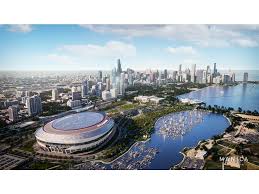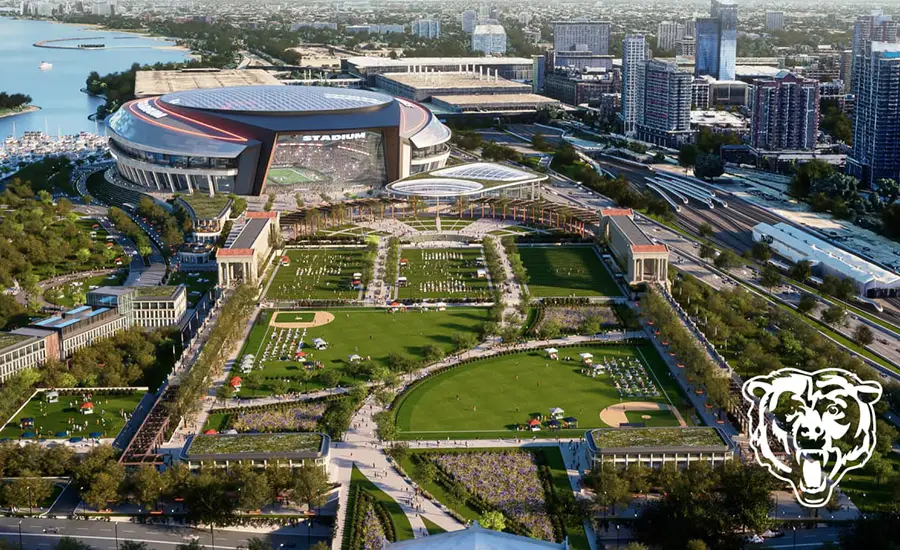Chicago Bears are planning for “a state-of-the-art, publicly owned enclosed stadium, along with additional green and expanded open spaces with access to the lakefront for families and fans, on the Museum Campus.
Bears worked with Kansas City-based architectural firm Manica to create plans for the proposed stadium that would be owned by the Chicago Park District.
The Bears plan to fund the stadium with $2.3B of private funding, including a $300 million loan from the National Football League and $2.3B in public funding that would need approval by the Illinois Sports Facilities Authority (ISFA), an Illinois government entity established in 1987 with the purpose of constructing and renovating professional sports stadiums.
The Bears Organization said it envisions the new lakefront stadium as a place where the city could host world-class events like the Super Bowl, Olympics or college level basketball finals. The new stadium would also welcome school teams to play and host events such as concerts or graduation ceremonies.
“This marks a pivotal moment for Chicago as we introduce a visionary project prioritizing the public good,” said Chicago Mayor Brandon Johnson. “The proposed stadium, accompanied by expanded open spaces and recreational facilities, exemplifies my administration’s commitment to enhancing the quality of life for all Chicagoans. The Chicago Bears’ proposal goes beyond mere construction: It will cultivate economic growth, job creation, and community enrichment. I commend the team for their dedication to serving the greater good with private investment, and I look forward to the positive impact it will have on our beloved city.”
Read also: USF Selects new CM Team for $340M Football Stadium Project

Construction phases for the new Chicago Bears’ lakefront stadium
Karen Murphy, executive vice president of stadium development for the Bears, said the overall project would be constructed in phases.
The first phase of the new stadium would include $325M for roadway and utility improvements, which she said are crucial to a new stadium.
“We need the $325 million [for infrastructure improvements] to open the stadium,” said Murphy, explaining that the team would seek city, state and federal funds to pay for these improvements.
The second phase would require $510M for parking, new parks and playing fields.
And the third phase would be require $665M for additional transportation improvements, retail and public attractions.
Opposing the new stadium
The Friends of the Parks released a statement opposing the new stadium.
“Once again, Chicago taxpayers are being told what is good for them,” the statement reads. “We are told that a new domed stadium on protected lakefront land will make Chicago a great city. We are already a great city—in large part due to our protected lakefront. As is so often the case in Chicago, the powerful and wealthy are demanding that our entire city stop and fast-track their plans to expand operations on the people’s lakefront.”
Warren said the team is abandoning its initial plans to build a stadium on 325 acres it previously purchased in northwest suburban Arlington Heights.
Read also: New Arlington Heights domed stadium to be constructed in Chicago
According to press release, Bears new lakefront stadium and associated campus improvements will be one of the largest construction projects in Illinois history, representing about $4.7 billion of direct capital investment and also creating thousands of jobs for a regional workforce. It will add open space, improve accessibility, and provide Chicago families and tourists a safe place to gather year-round.
This transformative new stadium project would expand public open space, create over $8 billion in regional economic impact. It wound bring more than 43,000 construction jobs and about 4,200 new annual jobs to the Chicago region. The proposed Chicago Bears’ new lakefront stadium would be built to bid for and host Super Bowls, NCAA championships, and other significant events that drive tourism dollars, according to press release.
Read also: Disputed US$2 billion Chicago Bears domed stadium construction set to move forward
